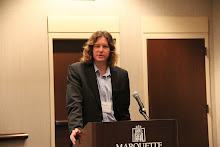I just found out another interesting historical tid-bit about the philosophical environment of the 1930s, this time having to do with the movement of Heidegger's work into France.
I enjoy the work of Sartre but when looked at as a reading of Heidegger, which is obviously not the only way to look at Sartre, it always struck me as an attempt to import Descartes into Heidegger's overt attempt to decidedly move away from Descartes. Sartre is individualist and, arguably, from a Heideggerian perspective his obsession with radical freedom is just misguided. However, if you read my previous post about Heidegger in the 1930s, you will recall that I do believe Heidegger went through an overly individualist phase in which he too was obsessed with what, both before and after the 30s, he would consider a philosophically mistaken conception of freedom.
Now the historical tid-bit. The first work of Heidegger's Sartre read was Henry Corbin's translation of Heidegger's "What is Metaphysics". He read it in 1931, and it was given as a lecture by Heidegger in 1929. For a discussion of this fact see Ethan Kleinberg's Generation Existential from which I am drawing this information about Sartre. Not only is it fascinating that in "What is Metaphysics" Heidegger more directly questions the Nothing, which will become so central to Sartre, but for me it is interesting to note that this was the start of what I consider Heidegger's individualist period of the early and mid 30s, with an odd focus on individual freedom occupying a portion of the text.
Granted, I have not yet decided where "What is Metaphysics" falls in my interpretation of Heidegger's thought in the 1930s. I am going to go back and reread the work to clarify my own position on it. But if it fits Heidegger's more individualist freedom oriented position of, say, Introduction to Metaphysics or the Origin of the Work of Art lectures, rather than the final published form the work takes, then it is possible to say not that Sartre radically misconstrued Heidegger but rather that he read Heidegger at what I would consider to be his worst. Of course this wasn't helped by problems in the translation of Heidegger into French.
Subscribe to:
Post Comments (Atom)


It reminds me of my ex-girlfriend, who always asked me: "Why do you read such depressing books and authors like Nietzsche, Heidegger or Sartre?" Still on these days I can't understand why some people feel sad when reading these philosophies... I guess it's what Nietzsche called "hammering philosophy".
ReplyDeleteNothing, which will become so central to Sartre, but for me it is interesting to note that this was the start of what I consider Heidegger's individualist period of the early and mid 30s, with an odd focus on individual freedom occupying a portion of the text.
ReplyDeletenice
ReplyDelete